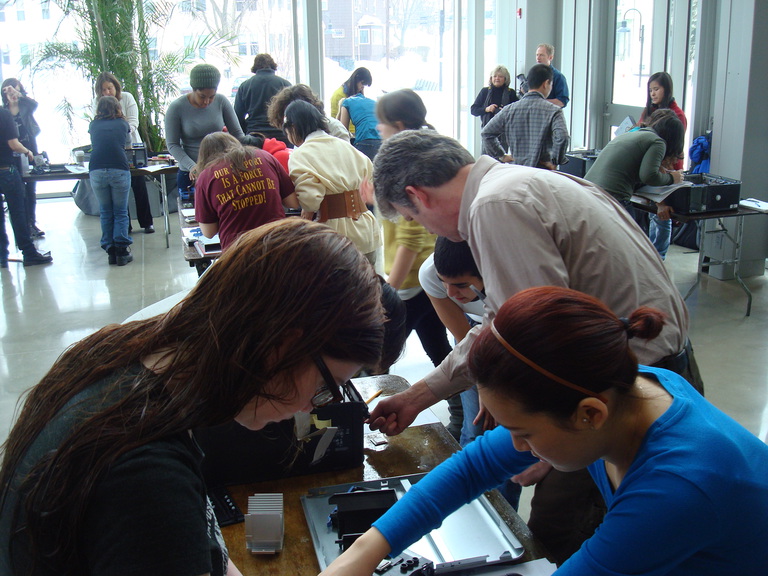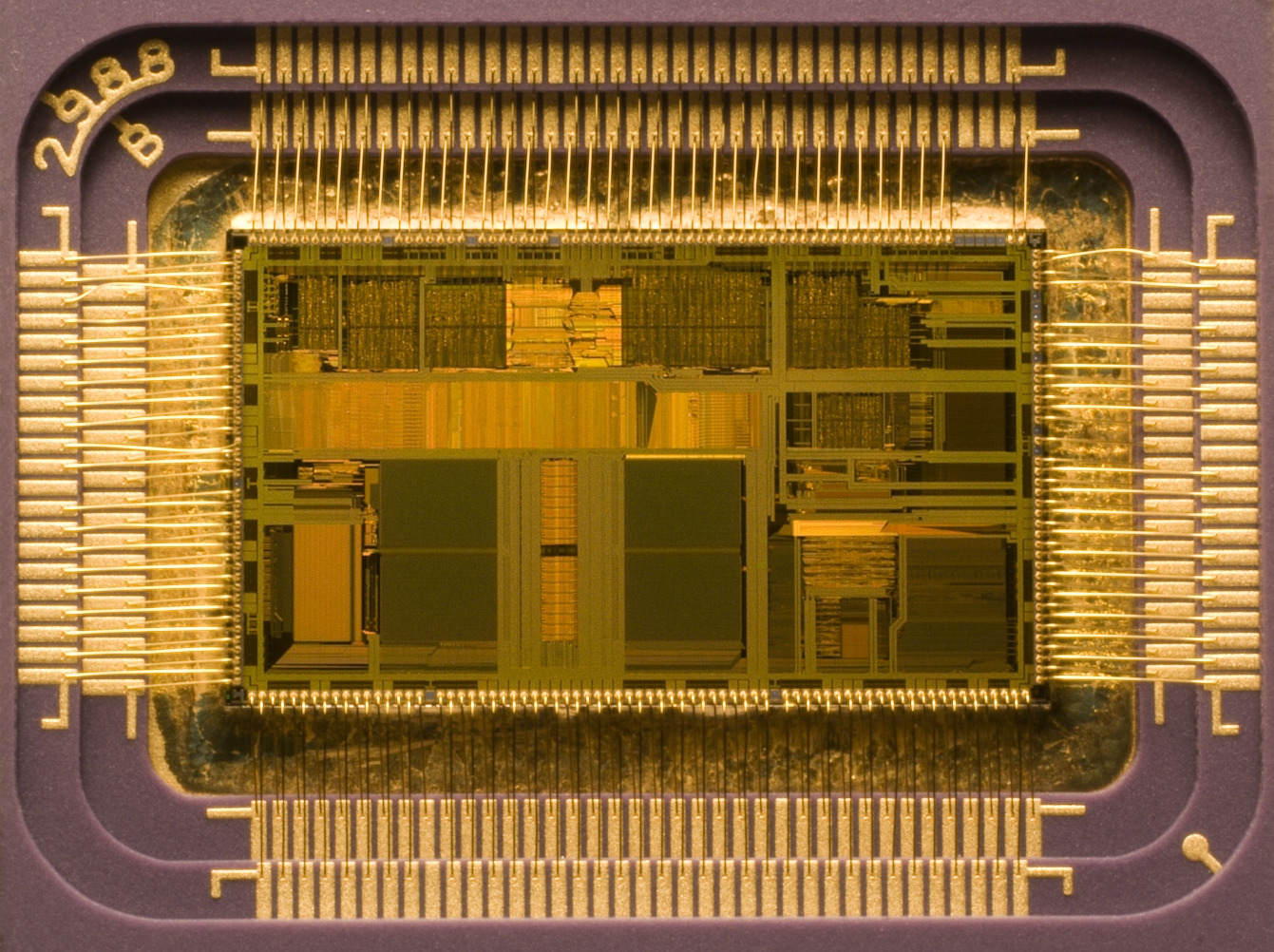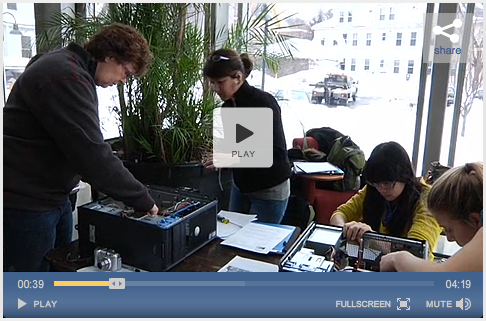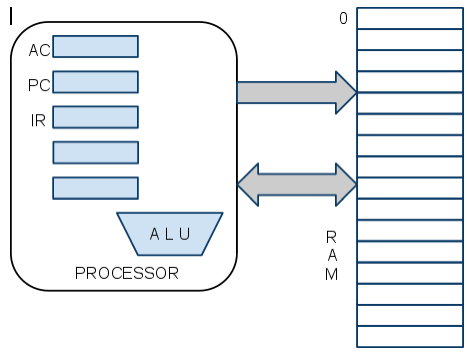--D. Thiebaut 08:44, 7 January 2011 (EST)
Back to Main Page for CSC103
Prof
|
Dominique Thiébaut email
Dept. Computer Science
Ford Hall, 356.
Telephone: 3854
Office Hours: M:4-5, T3-4, W3-4, and my appointment
|
Weekly Schedule
| Week |
Topics |
Reading
|
Week 1
1/24
|
- Monday:
- Introduction to the semester
- Overview
- Binary System
- The Transistor
- Wednesday
- Quick review
- George Boole (1779-1848)
- Logic, logic expression = boolean expression
- Any complicated logic expression can be expressed with only 3 operators: AND, OR, and NOT
- Shannon (1916-2001), in 1948 writes a Master's thesis at MIT: Any binary numerical computation can be performed using logic expressions, and logic operators
- Verify that we can add in binary.
- Therefore we should be able to add using AND, OR, and NOT.
- This creates a need for electrical circuits that implement the 3 boolean operators
- Logic Gates: NOT, AND, OR
- Truth tables and verification of rules of addition
|
- Read Chapter 1 of the textbook. Skip Section 1.3 and up.
|
Week 2
1/31
|
- Two-bit adder (verify the equations with this exercise
- Logic Gates
- Data sheet for the AND gate.
- Logic Design
- Simulator
- Lab #1 Part 1 only, (and a copy of the simulator courtesy of Debbie S. and her lab partner)
- Wednesday
|
|
Week 3
2/7
|
- Monday
- Wednesday
- Review of WikiMedia editing
- Review of demolition lab
|
Please watch the following videos before the lab on 2/7!
|
Week 4
2/14
|
- Execution of an instruction (pdf)
- Exercise 1: initialize the contents of several variables to 0
- Exercise 2: increment a counter
- Exercise 3: compute sum of 3 variables
- Exercise 4: create an index and use it to sum up the same 3 variables
- Loops (infinite loop)
- JMP instruction and labels
- Exercise 5: create an infinite loop (incrementing a variable, for example)
- Exercise 6: create an infinite loop that clears the memory starting at 10
- Exercise 7: why does the program of Exercise 6 stop?
- Exercise 8: write a loop that loops 10 times (use a counter)
- Exercise 9: write a loop that stores 55 in the memory locations between 15 and 30
|
- Concentrate on Sections 3.2 and 3.4 in the textbook.
- Read the introduction to the xComputer Applet.
- Start reading the papers on the Singularity which we will discuss the last day of class:
|
Week 5
2/21
|
- Monday
- Our JavaScript editor: http://htmledit.squarefree.com/
- Elements of a Web page: the <html>, <body>, and <h1> tags
- Creating a Web page and loading it up in a browser
- HTML links: <a href="http://www.smith.edu">Smith College</a>
- javascript
- printing strings
- comments
- variables
- displaying the contents of variables
- concatenating strings and variables
- computing with variables
- loops
- First part of Lab #4 on Javascript: creating a javascript program, and running it.
- Wednesday: Rally Day

- Lab #4 (first part)
- NO HOMEWORK this week
|
|
Week 6
2/28
|
- Monday
- Javascript
- Lab #4: Do Sections 1.3, and 2. Do all the subsections of Section 2.
- Wednesday
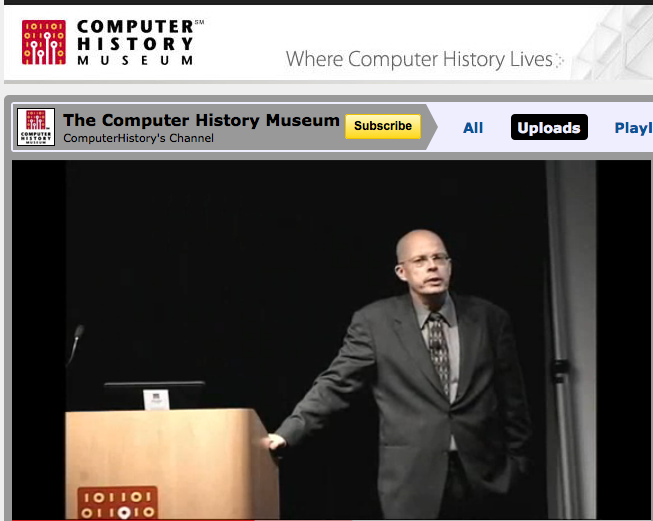 - Q&A on Javascript
- A look at the history of computing: two different dimensions
- Babbage and his Difference Engine #2, 1840's
- BBC's History of computers Part I.
- When Computers were Human, by Prof. Grier, 2007. (first 44min 44sec).
- Some questions to start a discussion
- In the Babbage video, did you hear any expressions mentioned in the videos that has stuck throughout the times?
- What attributes are given to Babbage's computer that are still debated today?
- What similarity between Babbage's engine and today's computers?
- What are the key players in the history of computers?
- "Computers" is a vague term, in fact. What particular computer "products" seem to mark the evolution of computers?
- What companies have influenced the PC industry? How active are they today?
- Grier video: What is the importance of Halley's comet?
- At some point there is a graph showing humans as part of a graph. Most cost effective (cheap) option for computations. Have you heard of Amazon's "Mechanical Turk"? What is it? How is that related to the video?
- How are canons connected to the main story?
(handout)
|
|
Week 7
3/7
|
- Monday
- Wednesday
- Class discussion: The singularity
|
|
Week 8
3/14
|

|
|
Wiki pages
Click here to access the class Wiki pages.
Additional Resources



